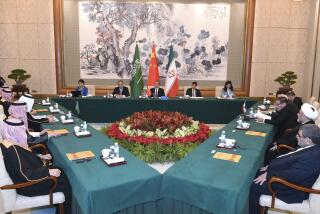OPEC Agrees to Small Cuts in Oil Prices : Saudis Ram Decision Past Dissenters From Algeria, Libya, Iran
- Share via
GENEVA — Minor cuts in the price of some lower-grade oils were approved today by a majority of OPEC’s oil ministers. Saudi Arabia had pushed for the decision; Algeria, Libya and Iran opposed it.
Analysts said the amount of oil involved was so small and the cuts so slight that there would be no immediate effect on the price consumers pay at the pump for a gallon of gasoline.
In the 10-3 decision, the Organization of Petroleum Exporting Countries reduced the price of heavy crude oil by 50 cents a barrel to $26 and lowered medium-grade oil by 20 cents to $27.20 a barrel. The price of Arabian Light crude, the premium blend used by OPEC to set the prices of its other oils, was left unchanged at $28 a barrel.
Still Not in Line
The cuts failed to bring OPEC in line with prices quoted in the open market, where Arabian Light was quoted Thursday at $27, Arabian Medium at $25.50 and Arabian Heavy at $25, according to Telerate Energy Services, a private market-information firm.
The deal was intended to smooth over some internal divisions in OPEC, but analysts said it would do little to help the group sell more oil or to slow the steady downward trend in world oil prices.
“They bought time to study the really serious problems” facing them, said Paul McDonald, a senior oil analyst at the investment firm of Shearson Lehman Bros. Ltd. in London. He called the price cuts “almost meaningless” to the market.
Stephen Smith, an energy analyst at Data Resources Inc. in Lexington, Mass., predicted that the official price of Arabian Light would fall to $26 a barrel by the end of this year and to $24 by 1987.
Each $1 reduction in the world price of a barrel of oil, when passed on entirely to consumers, is the equivalent of a cut of about 2 1/2 cents in the retail price of a gallon of gasoline.
20-Year Low
Saudi Arabia, whose oil production has plunged to a 20-year low this summer, engineered the price-cutting deal in hopes of selling more heavy crude this fall when it is expected to be in greater demand.
The fact that it took four full days of negotiations to reach only a split decision on the Saudi plan is evidence of how badly divided OPEC has become.
Earlier this month the ministers held three days of talks in Vienna, Austria, in search of new measures to regain a grip on the shrinking oil market. But they failed, issuing only a lame promise to stop cheating on their unenforceable pricing rules.
Ahmed Zaki Yamani, the Saudi oil minister, told reporters he was pleased with the majority decision. But he was unusually quiet after leaving the hotel ballroom where the 13 ministers had met in a circle of overstuffed green armchairs. Yamani did not hold his usual post-meeting news conference.
The Saudis had threatened before this meeting to unilaterally boost their oil production, discounting their prices if necessary, unless an official price cut were adopted and the other member countries stopped offering discounts of their own.
The ministers agreed to hold a special meeting this fall, probably in early October, to consider changes in OPEC production policy. The next regular conference has been scheduled for Dec. 7 in Geneva.
OPEC’s president, Indonesian Oil Minister Subroto, conceded to reporters that today’s slight price cuts would have no immediate effect on the market.
“This is an effort to correct, however little, the discrepancies we see in the market,” he said.
More to Read
Inside the business of entertainment
The Wide Shot brings you news, analysis and insights on everything from streaming wars to production — and what it all means for the future.
You may occasionally receive promotional content from the Los Angeles Times.










